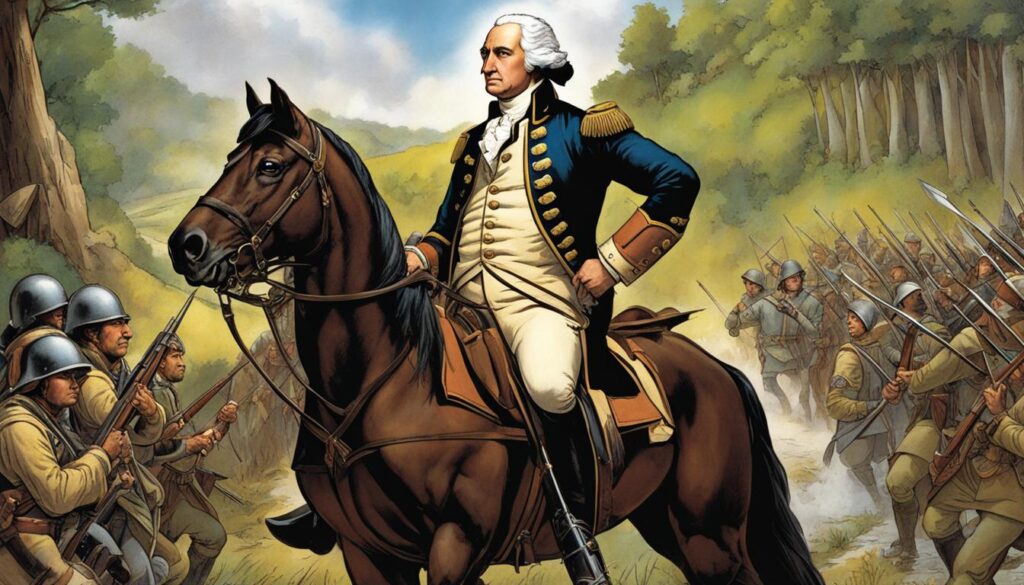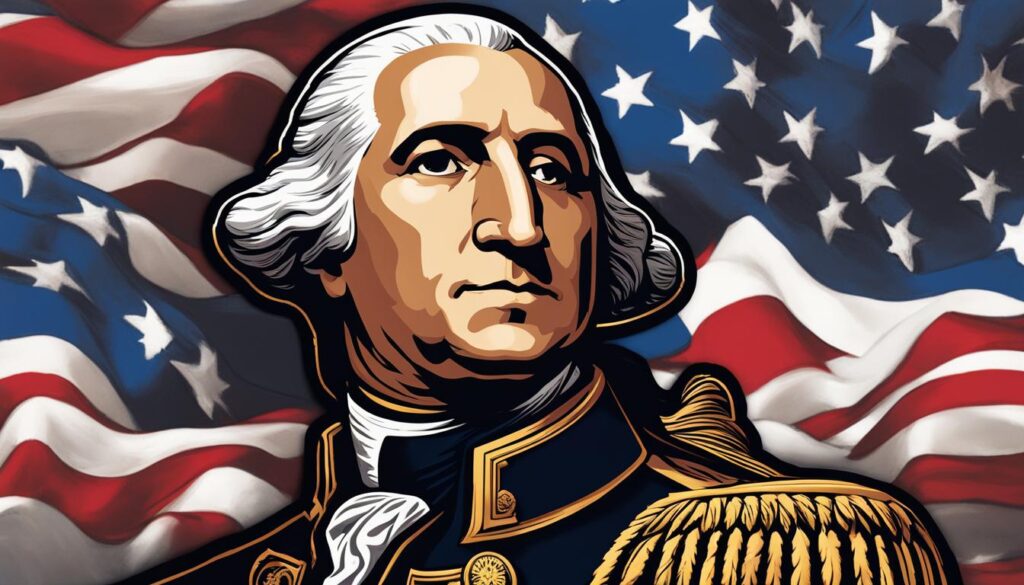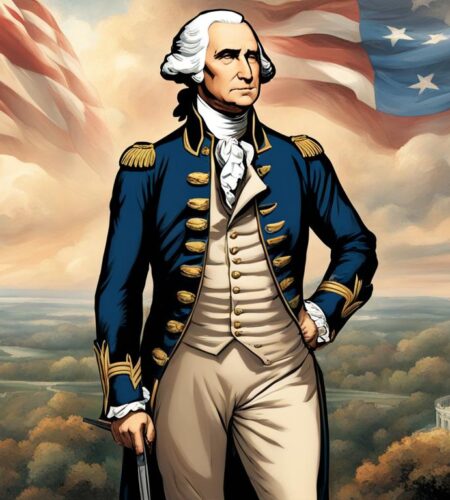George Washington was not only the first President of the United States but also a founding father of the nation, leading the way in the American Revolution and shaping the country’s political system. He was a military hero, a visionary leader, and a beloved icon of American history. Washington’s legacy continues to inspire people around the world, and his impact extends far beyond his time.
In this article, we will explore George Washington’s life, leadership, and legacy, including his connection to Mount Vernon. We will examine his contributions to the American Revolution, his presidency, and his enduring influence on American politics and culture. Join us as we celebrate one of the greatest figures in American history.
Key Takeaways
- George Washington was the first President of the United States.
- Washington played a significant role in the American Revolution as a military leader and founding father.
- Mount Vernon, Washington’s home, holds historical significance as a reflection of his life and legacy.
- Washington’s presidency established important policies and helped shape the United States’ political system.
- George Washington is remembered as an American icon and a symbol of leadership.
Early Life and Revolutionary Background
George Washington, one of the founding fathers of the United States, was born in Westmoreland County, Virginia on February 22, 1732. Growing up, he received a basic education and worked as a land surveyor in his youth. He then joined the military and served during the French and Indian War, where he gained valuable experience in military tactics and leadership skills.
With tensions between the American colonies and Great Britain on the rise, Washington became increasingly involved in the movement for American independence. He was appointed as a delegate to the Continental Congress and worked alongside other founding fathers such as Thomas Jefferson and John Adams to draft the Declaration of Independence.
Washington’s military experience and leadership skills would prove invaluable to the American Revolution. In 1775, he was appointed as commander-in-chief of the Continental Army and successfully led the colonies to victory in the war against Great Britain.
“I hope I shall possess firmness and virtue enough to maintain what I consider the most enviable of all titles, the character of an honest man.”
Leadership During the Revolutionary War
George Washington’s leadership during the Revolutionary War was crucial to the eventual victory of the American Revolution. As a military strategist, Washington made several critical decisions that shaped the course of the war. He understood the importance of morale and sought to inspire his troops through his own example of dedication and perseverance.
Washington’s military victories, such as the capture of Trenton and Princeton, showed his ability to outmaneuver the British and seize key objectives. His tactical retreats, such as the one at White Plains, helped to preserve his army and avoid total defeat.
Washington’s leadership extended beyond his military prowess. He was able to unite the disparate forces of the Continental Army and create a sense of national purpose. His leadership style was one of firmness, but also of compassion and respect for his troops.
As Washington himself said, “Necessity…compels me to observe to you that the patience and fortitude of the army are almost exhausted.” Despite the odds against them, Washington’s leadership helped to sustain the revolutionaries and ultimately secured America’s independence from Great Britain.
“I have no doubt, if the army can be kept together another year, and our affairs put in a tolerable train, we shall be able to make a great and glorious defense, and come off victorious.”
The Road to Presidency
George Washington’s journey to the presidency was shaped by his role in the Constitutional Convention. As one of the founding fathers of the United States, he played a crucial part in framing the nation’s constitution and advocating for a strong federal government.
Washington’s unwavering commitment to the new nation earned him the title of “Father of His Country.” He became the unanimous choice for the first President of the United States, with all electors casting their votes in his favor.
As the first President, Washington set the standard for presidential leadership, establishing the importance of balancing executive power with the needs of the American people. He faced challenges head-on, including the Whiskey Rebellion and threats to national security, and worked tirelessly to maintain the unity of the nation.
“Happiness and moral duty are inseparably connected.”
Washington’s steadfast leadership helped shape the office of the presidency, creating a strong foundation for future presidential administrations. His contributions to American history and presidential leadership continue to make an impact, cementing his status as one of the most influential figures in U.S. history.

Washington’s Presidency and Policies
As the first President of the United States, George Washington faced the challenging task of establishing a strong central government while navigating the complexities of foreign relations and economic policies. Through his leadership and vision, Washington laid the groundwork for the nation’s future.
| Economic initiatives | Washington implemented policies that prioritized economic growth and stability, including the establishment of a national bank and the promotion of domestic manufacturing. |
|---|---|
| Foreign policies | Washington pursued a policy of neutrality in international affairs, seeking to avoid entanglement in foreign conflicts while promoting trade and diplomacy. |
| Central government | Washington’s efforts to establish a strong central government included the creation of executive departments and the development of a federal court system. |
Through his presidential leadership, Washington set a standard for future American leaders and solidified his place as a founding father of the United States. His economic initiatives, foreign policies, and commitment to a strong central government continue to shape American history.
The Founding Father and Statesman
George Washington was more than just a military leader and the first President of the United States – he was a founding father and statesman who played a crucial role in shaping American history. In this section, we will explore his contributions to the drafting of the Constitution, his establishment of Washington D.C. as the nation’s capital, and his unwavering commitment to the ideals of the American Revolution.
The Drafting of the Constitution
As a key figure in the Constitutional Convention of 1787, George Washington was instrumental in the drafting of the U.S. Constitution. His leadership and diplomatic skills were essential in achieving a compromise between the diverging views of the delegates, and his insistence on a strong central government helped to establish the foundations for a more unified federal system.
Establishment of Washington D.C.
Another significant contribution made by George Washington to American history was the establishment of the nation’s capital in Washington D.C. As one of the few founding fathers who owned property outside of the original thirteen colonies, Washington saw the potential of a new federal district. He signed the Residence Act of 1790, which granted authority to select a site for the capital along the Potomac River, and oversaw the construction of the city that now bears his name.
| City Name | Population |
|---|---|
| New York City | 25,000 |
| Philadelphia | 29,000 |
| Washington D.C. | 1,429,000 |
Commitment to Revolutionary Ideals
Throughout his life and career, George Washington remained dedicated to the ideals of the American Revolution. He believed in the principles of democracy, freedom, and liberty, and fought to defend these values both on the battlefield and in his political career. His unwavering commitment to these principles served as a model for future generations of American leaders.
George Washington’s legacy as a founding father and statesman is an integral part of American history. His leadership, diplomatic skills, and unwavering commitment to the ideals of the American Revolution helped to shape the nation’s future and establish a strong foundation for American leadership.
Post-Presidential Years and Legacy
After his presidency, George Washington retired to his beloved Mount Vernon in Virginia, where he spent his remaining years tending to his estate and staying updated on the country’s political affairs. He continued to play a key role in shaping the early years of the United States, advising his successors in office and advocating for a strong central government.
Washington’s legacy as a founding father and American icon remained strong long after his death in 1799. He was remembered for his contributions to American history, including his leadership during the Revolutionary War and his establishment of the presidency. In addition, Mount Vernon has become a popular tourist attraction, drawing visitors from around the world to pay tribute to Washington’s life and legacy.
As we reflect on the post-presidential years and legacy of George Washington, we are reminded of his enduring influence on American leadership and his role as one of the most important founding fathers of the United States.
George Washington’s retirement to his estate, Mount Vernon, was a significant moment in his post-presidential years.
Remembering George Washington
George Washington’s birthday, on February 22nd, is celebrated annually in the United States as a national holiday. This day is an opportunity to reflect on Washington’s contributions to American history and leadership.
Washington’s legacy is remembered in various forms, from landmarks and symbols to annual events. The most famous of these symbols is the Washington Monument, an obelisk that stands 555 feet tall in Washington D.C. The monument honors Washington’s contributions to the American Revolution and his role as the first President of the United States.
Another enduring symbol of Washington’s legacy is Mount Vernon, his beloved home in Virginia. Today, Mount Vernon is a popular tourist destination, museum, and educational center that offers visitors a glimpse into Washington’s life and times. The estate’s website includes a virtual tour of the mansion, museum artifacts, gardens, and historic preservation programs for the public.
Washington’s leadership and contributions to American history are also celebrated at various museums and historical sites throughout the country. Some of these include the National Museum of American History, the Smithsonian’s National Portrait Gallery, and the George Washington Birthplace National Monument in Virginia.
To this day, Washington’s leadership and legacy continue to inspire Americans to strive for excellence in their own lives. From his role in the American Revolution to his presidency and beyond, George Washington’s impact on American history and leadership cannot be overstated.
Mount Vernon: Washington’s Home
Mount Vernon is a historic estate located in Virginia that served as the home of George Washington. The property was first purchased by Washington’s great-grandfather in 1674, and it remained in the family for over a century before George Washington inherited it in 1754.
Over time, Washington expanded the estate to include a mansion, gardens, a farm, and multiple other buildings. The estate served as a retreat for Washington during his presidency and as a place where he could entertain guests and visitors. Today, Mount Vernon is open to the public as a historic site and museum.
Visitors to Mount Vernon can explore the mansion and grounds, learn about Washington’s life and legacy, and see artifacts and exhibits related to his life and times. The estate remains an important symbol of American history and a testament to Washington’s enduring legacy as a leader and founding father.
George Washington in Popular Culture
George Washington’s symbolic importance in American history and leadership extends beyond academia and politics. In popular culture, Washington’s image and legacy endure, shaping the national imagination.
Washington has been depicted in various mediums, including movies, books, comics, and artworks. From historical biopics to fictional dramas, filmmakers and authors have tried to capture Washington’s essence and legacy, showcasing his heroism, wisdom, and integrity.
“I hope I shall possess firmness and virtue enough to maintain what I consider the most enviable of all titles, the character of an honest man.” – George Washington
Washington’s most famous image is Gilbert Stuart’s portrait, which appears on the one-dollar bill and the quarter. The portrait was reproduced on various products, from T-shirts to mugs, becoming a ubiquitous symbol of American patriotism.
Washington’s image has also been used in advertising, serving as a signifier of quality, trust, and patriotism. For example, on popular cereal boxes, Washington’s image was used to market the brand through a nostalgic and patriotic appeal, emphasizing quality, tradition, and national values.

Washington’s character has also been fictionalized in various ways. In recent years, Washington has appeared as a zombie fighter in “Abraham Lincoln vs. Zombies” (2012), a time traveler in “Assassin’s Creed III” (2012), and a sympathetic slave owner in “The Book of Negroes” (2015). These portrayals showcase the versatility and adaptability of Washington’s image and legacy, as well as their enduring relevance in contemporary popular culture.
Washington’s enduring popularity in popular culture attests to his iconic status as a founding father and national symbol. Washington’s legacy continues to inspire and influence generations of Americans, reinforcing his role as an American hero and leader.
Conclusion
In conclusion, George Washington holds a special place in American history as the first President of the United States and a founding father. His leadership during the Revolutionary War and his presidency laid the foundations for the nation’s future. As we reflect on his contributions, we are reminded of his steadfast commitment to the ideals of liberty, democracy, and unity.
His legacy continues to inspire generations of Americans, and his image and name are synonymous with courage, integrity, and leadership. We honor his memory through annual celebrations of his birthday, visits to his beloved home at Mount Vernon, and the preservation of his legacy in popular culture.
George Washington will forever be remembered as an icon of American history and leadership, and his indelible mark will continue to shape the nation’s destiny for years to come.
FAQ
Who was George Washington?
George Washington was the first President of the United States and one of the founding fathers. He played a pivotal role in the American Revolution and helped shape the nation’s early years.
Where was George Washington born?
George Washington was born in Westmoreland County, Virginia, on February 22, 1732.
What is George Washington’s legacy?
George Washington’s legacy includes his leadership during the American Revolution, his establishment of the presidency, and his contributions to the formation of the United States as a strong and independent nation.
How did George Washington become the first President of the United States?
George Washington was unanimously elected as the first President of the United States by the Electoral College in 1788. His reputation as a military leader and his vision for the new nation made him a popular choice among his fellow founding fathers.
What were George Washington’s major accomplishments?
Some of George Washington’s major accomplishments include leading the Continental Army to victory in the Revolutionary War, presiding over the Constitutional Convention, and serving two terms as President of the United States. He also played a key role in establishing the country’s early governmental institutions.
Where is Mount Vernon?
Mount Vernon is located in Fairfax County, Virginia, along the Potomac River. It was the plantation home of George Washington and is now a popular historic site and museum.
